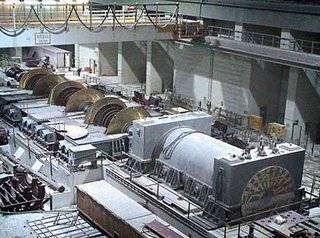
Iran learned a lot during its initial foray into building nuclear weapons. It all hinged on this one premise--don't do it the way Saddam did. Iran has been very successful at furthering its own nuclear ambitions as a result.
In 1991, Iranian President Hashemi Rafsanjani learned a few things after Saddam Hussein's very productive nuclear development facilities were partially uncovered.
1. Don't attack another country (Iraq invaded Kuwait) if all you have is chemical and biological weapons. Iran, although having recently been involved in a drawn-out war with Iraq, warned Saddam against the Kuwait invasion. Non-nuclear was and is seen by Iran as not a big enough deterrent to the United States. Iran still believes strongly that when its nuclear arsenal is fully ripe that the United States will be impotent in the face of it.
2. Make allies of fellow America haters in the region. Saddam was too busy being full of Saddam to see the importance of this concept. Iran, meanwhile, made associations that were lucrative to Pakistan, China, and North Korea. An initial payment of $50 million brought Pakistan on board the Iranian nuclear train.
3. Set up clandestine operations that are kept hidden from the eyes of the International Atomic Energy Agency (IAEA) and then build non- or small-functioning nuclear Potemkin Villages with which to present the image of cooperation with the international inspectors. One such smoke screen project was an experimental cyclotron installation in Karaj. This had a remarkable effect on European diplomats, convincing (and relieving them, perhaps?) that not only was Iran being 'cooperative', but also that their ability to enrich uranium was 'in its infancy'.
4. Make friends with the heads of the IAEA. Then they won't look so hard. IAEA heads, Hans Blix and Mohammed el Baradei, have made a business of looking the other way and intentionally under the wrong rocks when it comes to 'searching' for nuclear weapons. The years of covering for Iraq and Iran has now become more a case for them of saving face--not wanting to be embarrassed when it became clear that Iraq and Iran had significant nuke development facilities all along. More than once, IAEA investigators have been fired or threatened when they caught the scent of a fresh nuclear trail. In one case in Iraq, former IAEA investigator David Kay was fired as he arrived unannounced and was able to discover, with the help of US satellite imagery large machines known as calutrons being quickly ferried away from Tarmiya to the Abu Ghraib prison and military compound. Baker and some of his associates were able to photograph and later substantiate what they had seen. He and his inspection teams connected these dots with others and determined that Saddam had at least 3 separate programs that were as near as 3 months away from producing a nuclear bomb.
5. Make a moral claim for the need for nuclear weapons in order to counteract the ambitions of the Great Satan. Rafsanjani thought this was perhaps the biggest mistake Saddam made, never to combine his lust for domination with a seemingly innocuous claim that his nuclear research was exclusively for civilian purposes, such as medical and agricultural advances. Iran has not made the same mistake, timing its references to the Little and Great Satans with the necessity of Iran to gain nuclear parity with its enemies. Incessantly, as of late, Iran makes the completely spurious claim that its nuclear research is for non-threating purposes only.
6. Line the pockets of other governments who allow sale to you of both civilian items and items that have dual-use (including nuclear) purposes, so that it becomes an economic hardship for these countries to face the facts when the facts become evident. France, Germany, and other European countries fall into this category.
It was with obvious understanding of the Iraqi threat of nuclear weapons that Democrats and Republicans joined with President Bill Clinton to declare Iraq a rogue nation that must be dealt with before its nuclear ambitions came to full fruition. If was with this same understanding that members of Congress joined George W. Bush to declare war on Saddam Hussein.
If nuclear weapons facilities have not been found in Iraq, it is not because they weren't there before. They have been found there before, and both the Clinton and Bush administrations were perfectly rational to assume that Hussein was continuing to develop his nuclear program.
Maybe he was. A lot of individuals from the United Nations, to the IAEA, to Iran have a vested interest in ensuring that nuclear weapons are not discovered in Iraq. With the cover of the Oil-for-Food Alumni club, they could be anywhere.
Who knows? Somebody does. Saddam quickly scuttled some of his best military aircraft to Iran. What about nuclear warhead production equipment? Or was Iraq simply always a Potemkin village to obscure their joint nuclear ambitions in Iran?
No comments:
Post a Comment